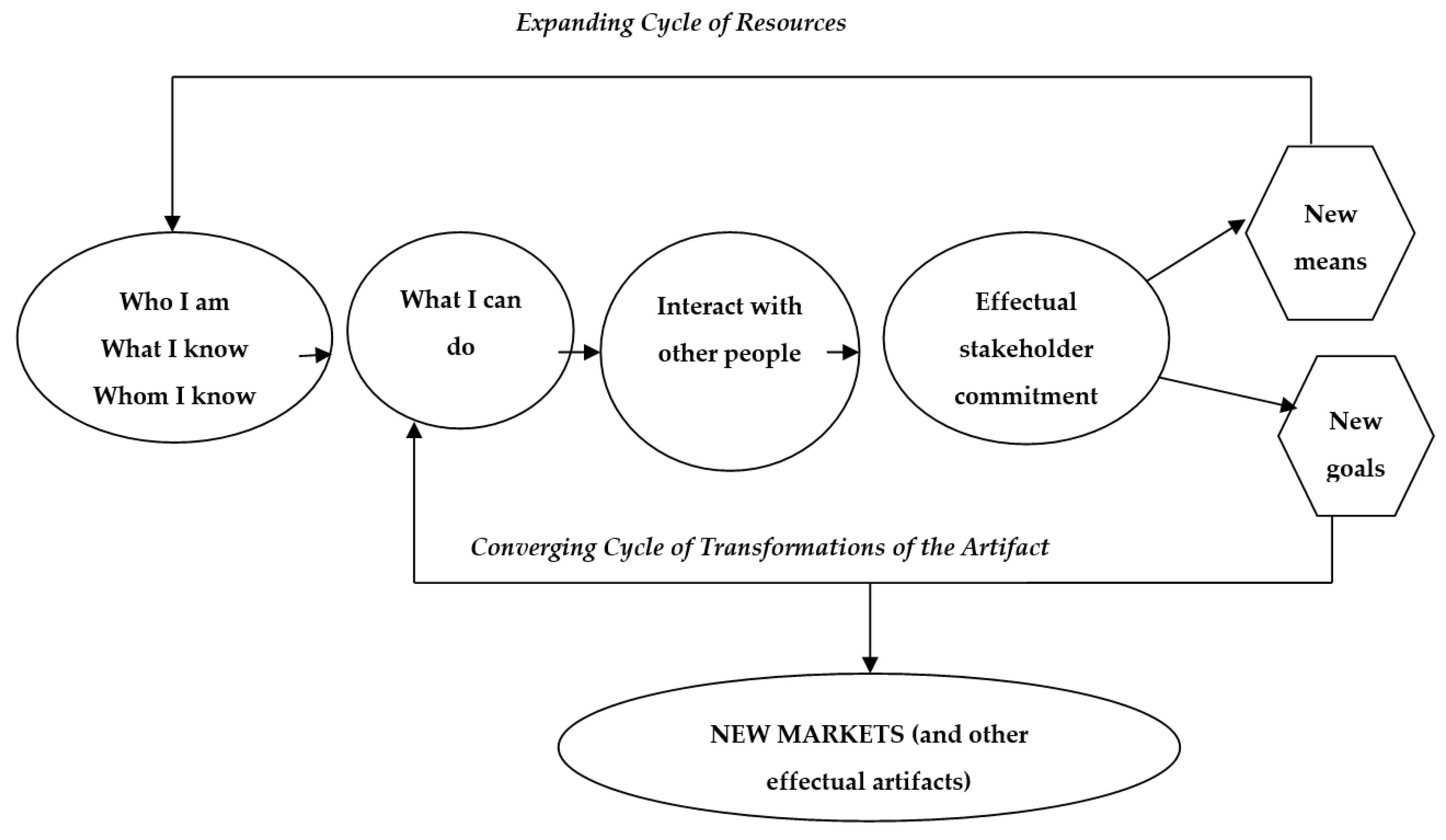Internationalization of SMEs and Effectuation: The Way Back and Forward †
Abstract
:1. Introduction
2. Effectuation: An Overview of the Concept’s Evolution
3. Effectuation Versus Causation: A Conceptual Review
4. The Importance of Effectuation in the International Context
5. Conclusions
References
- Perry, J.T.; Chandler, G.N.; Markova, G. Entrepreneurial effectuation: A review and suggestions for future research. Entrep. Theory Pract. 2012, 36, 837–861. [Google Scholar] [CrossRef]
- Fisher, G. Effectuation, causation, and bricolage: A behavioral comparison of emerging theories in entrepreneurship research. Entrep. Theory Pract. 2012, 36, 1019–1051. [Google Scholar] [CrossRef]
- Sarasvathy, S.D. Causation and effectuation: Toward a theoretical shift from economic inevitability to entrepreneurial contingency. Acad. Manag. Rev. 2001, 26, 243–263. [Google Scholar] [CrossRef]
- Baker, T.; Nelson, R.E. Creating something from nothing: Resource construction through entrepreneurial bricolage. Adm. Sci. Q. 2005, 50, 329–366. [Google Scholar] [CrossRef]
- Beckman, C.M.; Eisenhardt, K.; Kotha, S.; Meyer, A.; Rajagopalan, N. Technology entrepreneurship. Strateg. Entrep. J. 2010, 6, 89–93. [Google Scholar] [CrossRef]
- Shane, S.; Venkataraman, S. The promise of entrepreneurship as a field of research. Acad. Manag. Rev. 2000, 25, 217–226. [Google Scholar] [CrossRef]
- Wiltbank, R.; Dew, N.; Read, S.; Sarasvathy, S.D. What to do next? The case for non-predictive strategy. Strateg. Manag. J. 2006, 27, 981–998. [Google Scholar] [CrossRef]
- Read, S.; Dew, N.; Sarasvathy, S.D.; Song, M.; Wiltbank, R. Marketing under uncertainty: The logic of an effectual approach. J. Mark. 2009, 73, 1–18. [Google Scholar] [CrossRef]
- Brettel, M.; Mauer, R.; Engelen, A.; Küpper, D. Corporate effectuation: Entrepreneurial action and its impact on R&D project performance. J. Bus. Ventur. 2012, 27, 167–184. [Google Scholar]
- Sarasvathy, S.D. Effectuation: Elements of Entrepreneurial Orientation; Edward Elgar Publishing: Cheltenham, UK, 2008. [Google Scholar]
- Sarasvathy, S.D.; Dew, N. Entrepreneurial logics for a technology of foolishness. Scand. J. Manag. 2005, 21, 385–406. [Google Scholar] [CrossRef]
- Dew, N.; Sarasvathy, S.D. What effectuation is not: Further development of an alternative to rational choice. In Proceedings of the Annual Meeting Academy Management, Denver, CO, USA, 11–14 August 2002. [Google Scholar]
- Knight, F. Risk, Uncertainty, and Profit; Hart Schaffner and Marx prize essays no 31; Houghton Mifflin: Boston, MA, USA, 1921. [Google Scholar]
- Weick, K.E. The Social Psychology of Organizing (Topics in Social Psychology Series); McGraw-Hill Humanit: New York, NY, USA, 1979. [Google Scholar]
- March, J.G. The technology of foolishness. Ambiguity Choice Organ. 1976, 69, 81. [Google Scholar]
- Chandler, G.N.; DeTienne, D.R.; McKelvie, A.; Mumford, T.V. Causation and effectuation processes: A validation study. J. Bus. Ventur. 2011, 26, 375–390. [Google Scholar] [CrossRef]
- Coviello, N.E.; McAuley, A. Internationalisation and the smaller firm: A review of contemporary empirical research. MIR Manag. Int. Rev. 1999, 223–256. [Google Scholar]
- Sarasvathy, S.; Kumar, K.; York, J.G.; Bhagavatula, S. An effectual approach to international entrepreneurship: Overlaps, challenges, and provocative possibilities. Entrep. Theory Pract. 2014, 38, 71–93. [Google Scholar] [CrossRef]
- Kalinic, I.; Sarasvathy, S.D.; Forza, C. ‘Expect the unexpected’: Implications of effectual logic on the internationalization process. Int. Bus. Rev. 2014, 23, 635–647. [Google Scholar] [CrossRef]
- Harms, R.; Schiele, H. Antecedents and consequences of effectuation and causation in the international new venture creation process. J. Int. Entrep. 2012, 10, 95–116. [Google Scholar] [CrossRef]
- Galkina, T.; Chetty, S. Effectuation and networking of internationalizing SMEs. Manag. Int. Rev. 2015, 55, 647–676. [Google Scholar] [CrossRef]
- Matalamäki, M.J. Effectuation, an emerging theory of entrepreneurship–towards a mature stage of the development. J. Small Bus. Enterp. Dev. 2017, 24, 928–949. [Google Scholar] [CrossRef]

| Causation | Effectuation | |
|---|---|---|
| Goals | Pre-defined | Emerging |
| Decisions parameters | Maximization of expected return | Affordable loss |
| Uncertainty | Planning/competitive analysis | Alliances |
| Basis of exploitation | Capabilities and resources | Environmental contingencies |
Publisher’s Note: MDPI stays neutral with regard to jurisdictional claims in published maps and institutional affiliations. |
© 2018 by the authors. Licensee MDPI, Basel, Switzerland. This article is an open access article distributed under the terms and conditions of the Creative Commons Attribution (CC BY) license (https://creativecommons.org/licenses/by/4.0/).
Share and Cite
Guili, H.E.; Ferhane, D. Internationalization of SMEs and Effectuation: The Way Back and Forward. Proceedings 2018, 2, 1422. https://doi.org/10.3390/proceedings2241422
Guili HE, Ferhane D. Internationalization of SMEs and Effectuation: The Way Back and Forward. Proceedings. 2018; 2(24):1422. https://doi.org/10.3390/proceedings2241422
Chicago/Turabian StyleGuili, Hamza El, and Driss Ferhane. 2018. "Internationalization of SMEs and Effectuation: The Way Back and Forward" Proceedings 2, no. 24: 1422. https://doi.org/10.3390/proceedings2241422
APA StyleGuili, H. E., & Ferhane, D. (2018). Internationalization of SMEs and Effectuation: The Way Back and Forward. Proceedings, 2(24), 1422. https://doi.org/10.3390/proceedings2241422





